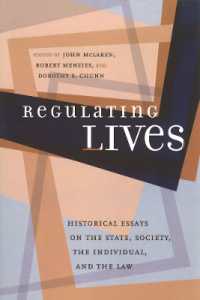- ホーム
- > 洋書
- > 英文書
- > Computer / General
Full Description
Level up your skill set to the latest that Oracle Database can offer. This book introduces features that are not well known that can transform your development efforts. You'll discover built-in functionality that can save you massive amounts of time that otherwise would be spent reinventing the wheel. You'll find that what used to take a lot of programming some years ago can be done with less code in a more reliable way today. Anyone using Oracle Database without the knowledge in this book is leaving valuable functionality-that their company has paid for-on the table, and this book opens the door to that functionality so that you can deliver reliable and performant solutions faster and more easily than ever.
Part I looks at features in SQL and PL/SQL that are underused and not well known. You'll learn about new join types, pattern matching across rows, Top N pagination (useful in reporting!), qualified expressions, and enhancements to iterators that reduce code complexity and make your logic easier to understand.
Part II covers how and when to invoke PL/SQL from SQL while maintaining performance. You'll learn about SQL macro functions for creating reusable SQL fragments, polymorphic table functions with return types determined by incoming argument types, and constructing and parsing JSON documents for data interchange with other systems.
Part III introduces a vast array of built-in functionality that Oracle provides that is just waiting to be used. Edition-based redefinition enables zero-downtime application and schema upgrades. Data redaction enables easier compliance with privacy laws and similar regulations by protecting sensitive data from those who have no need to see it. Virtual private databases provide the appearance of giving each user their own database, again helping to secure sensitive data. These features are just a taste of what the book provides. Soon you'll be improving your skillsand wondering why you ever worked so hard to solve problems that Oracle Database already solves for you.
What You Will Learn
Write more powerful code by incorporating underused features in SQL and PL/SQL
Optimize your integration between SQL and PL/SQL for best performance
Take advantage of enhanced set operators, lateral joins, row-based pattern matching, and other advanced features in SQL
Make your code easier to understand through your use of newer PL/SQL features, such as qualified expressions and iterator enhancements
Integrate with web services and external data sources directly from the database
Create and parse JSON documents for easy data exchange and flexible schema design
Who This Book Is For
Any developer who is writing SQL or PL/SQL, PL/SQL experts who want to level up their knowledgeand skills to the latest features that Oracle Database provides, and developers who don't want to write their own solutions only to find out later that they've wasted their time by building something that Oracle Database provides out of the box
Contents
Part I. The Advanced Basics.- 1. Underutilized Functionality and Enhancements.- 2. Analytic Functions, Model, and Pivoting.- 3. Joins.- 4. Finding Patterns.- 5. Pagination and Set Operators.- 6. Conditional Compilation.- 7. Iterations and Qualified Expressions.- Part II. Multiple Techniques and Languages.- 8. SQL Macro and Polymorphic Table Functions and SQL Macros.- 9. Subquery Factoring, the WITH Clause Explained.- 10. Calling PL/SQL from SQL.- 11. Storing JSON in the Database.- 12. Creating and Parsing JSON in SQL.- 13. Creating and Parsing JSON in PL/SQL.- Part III. Oracle-Provided Functionality.- 14.Comparing and Manipulating JSON.- 15. Useful APEX Packages.- 16. Processing Data in the Background.- 17. Introspecting PL/SQL.- 18. See What You Need to See.- 19. Upgrade your Application with Zero Downtime.- 20. Choosing the Right Table.








